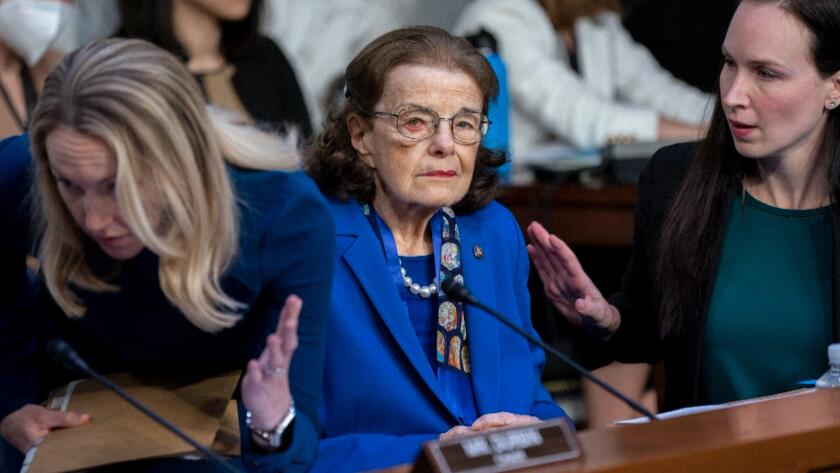With Feinstein’s death, what happens with her seat on Judiciary committee, other panels?
- Share via
WASHINGTON — Sen. Dianne Feinstein was the most senior Democrat on two of the Senate’s most powerful committees, and her death could set off a cascade of changes that affect California’s power in Washington.
Soon after news broke Friday that Feinstein, 90, had died overnight, Republican leaders indicated that they would not attempt to block Democrats from filling her committee assignments, including on the powerful Judiciary and Appropriations committees.
Following through would be a departure from their refusal in the spring to appoint a temporary replacement to the Judiciary committee while Feinstein was out for months to recover from a shingles infection. Feinstein’s absence meant Democrats didn’t have enough votes to get judicial nominees out of committee without Republican support.
- Share via
The Los Angeles Times’ Benjamin Oreskes breaks down how Gov. Gavin Newsom may decide on who will fill the late senators vacant seat and the legacy she leaves behind.
Senate Minority Whip John Thune (R-S.D. ) told Politico that he expects the Senate to follow precedent and allow committee vacancies to be filled without a fight. Republicans previously said in the spring that there was no precedent for temporarily replacing a sitting senator on a committee. Senior GOP Sen. John Cornyn of Texas said that Republicans weren’t going to “help what we consider to be controversial or unqualified nominees to get confirmed.”
Feinstein also served on the Senate Intelligence and Rules committees. Normally senators are assigned to committees by unanimous consent, but that motion can be filibustered. If a senator objects, Democrats would need 60 votes to appoint someone to fill Feinstein’s committee assignments. With an evenly divided Senate, they would need help from 10 senators to fill out the committees.
But even without delays from Republicans, Feinstein’s successor isn’t guaranteed her seats on the powerful Judiciary and Appropriations committees. And Senate Democrats may not want to wait long to fill them, either.
“It’s a complicated weekend for [Senate Majority Leader] Chuck Schumer, not only to keep government open but to figure out how he maps out this replacement so that it advantages the Democratic Party,” said associate professor of public policy at Brown University Wendy Schiller, an expert on the Senate.
Until another senator is named to the Judiciary committee, the panel is evenly split with 10 Republicans and 10 Democrats.
California was in the unusual position of having two senators on the Judiciary committee. Sen. Alex Padilla, also a Democrat, is not expected to give up his seat, so it is unlikely that Feinstein’s successor will end up there as well, particularly if other, more senior senators are interested in the spot.
“There’s always a little musical chairs when there’s a vacancy,” said Washington University political science professor Steven Smith. “Feinstein has been in place for a long time.”
Smith said a lot could hinge on how quickly California Gov. Gavin Newsom moves to fill Feinstein’s seat. If he waits several weeks as he did with Padilla’s appointment after then-Sen. Kamala Harris was tapped as Joe Biden’s vice president, Schumer could name a Judiciary committee replacement quickly in an effort to keep Biden’s judicial nominees moving.
Sen. Benjamin L. Cardin (D-Md.) was put forward as a temporary replacement for Feinstein on the committee last spring. He has since announced plans to retire at the end of this Congress and has been named Senate Foreign Relations chair.
Moving a senator to a new committee will be just the start of the shuffle, Schiller said.
“Smart senators who shape successful careers think very seriously about their committee assignments. It is the bulk of how they form their reputation, particularly in their first six years,” she said. “It is a complex chess game.”
As for Feinstein’s position on the Senate Appropriations committee, such a seat rarely would go to a freshman senator, particularly one not planning to run for a full term, as would likely be the case with whomever Newsom appoints as Feinstein’s successor. It might be a logical move for Padilla, though, Schiller said, who ran for and won a full term after initially being appointed to his Senate seat.
Home to more than 10% of the U.S. population, California usually sees one of its senators receive a seat on the Appropriations committee, which decides how the government appropriates money, or on the Armed Services committee. Padilla could opt to let go of his seat on the Environment and Public Works committee in exchange for more power on Appropriations, Schiller said.
A spokesperson for Padilla told The Times that any committee changes aren’t under discussion so soon after Feinstein’s death.
More to Read
Get the L.A. Times Politics newsletter
Deeply reported insights into legislation, politics and policy from Sacramento, Washington and beyond. In your inbox twice per week.
You may occasionally receive promotional content from the Los Angeles Times.












